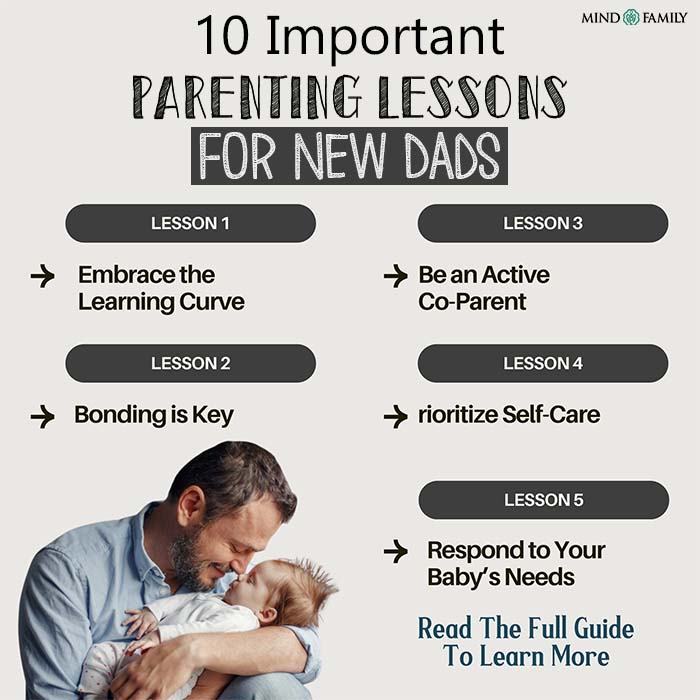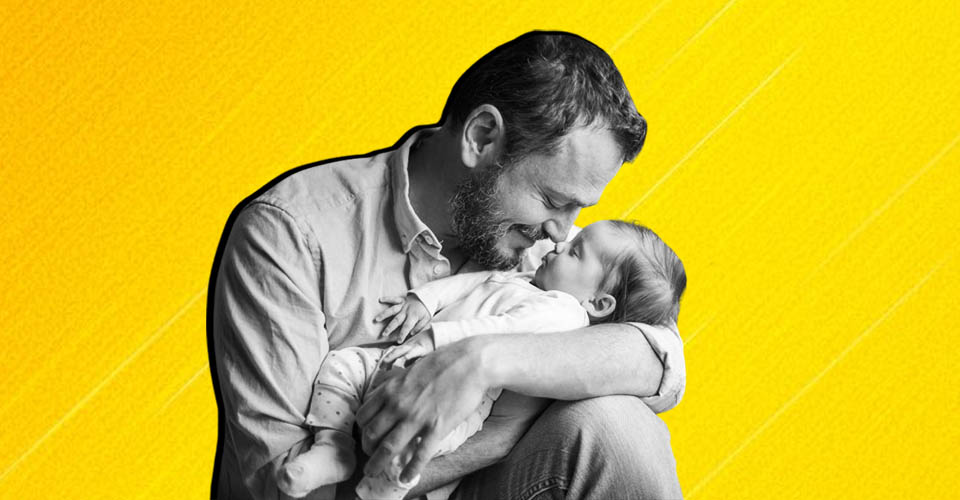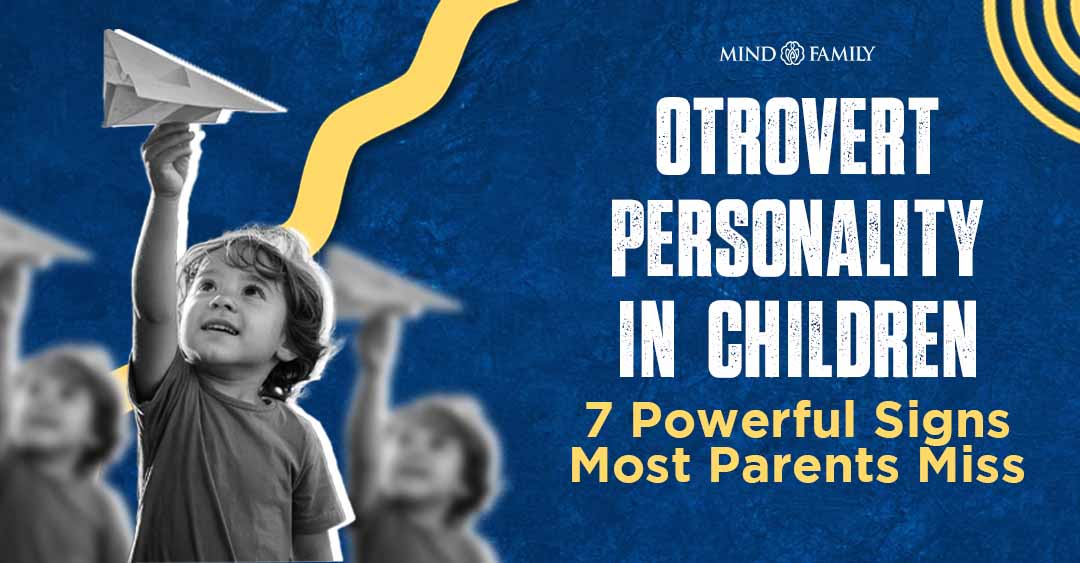John Green, the author of ‘The Fault In Our Stars’ once said, “The nature of impending fatherhood is that you are doing something that you’re unqualified to do, and then you become qualified while doing it.”
This shows that fatherhood is a journey and it is alright to make mistakes sometimes. After all, you are only a human! However, these reflections offer valuable insight into important parenting lessons for new dads. And it’s normal to feel unsure about yourself or at a complete loss, that is why we are here.
If you are preparing for fatherhood or if you are already dealing with children of your own, these 10 parenting lessons for new dads are a must-read. At Mind Family, we understand the pressures of fatherhood and that is why this curated list will be guided by the insights of dads who have already faced this situation.
So without further ado, let us begin!
10 Important Parenting Lessons For New Dads

Fatherhood is extremely important for children and society. Dads help kids grow up well by teaching them life lessons and being there for them. As a dad, you have immense responsibility on your shoulders.
But it’s impossible to know everything about parenting. And mistakes can happen. That is why you must look into the below important parenting lessons for new dads:
Lesson 1: Embrace the Learning Curve
Parenting is an evolving journey, not a destination. Matthew Rigberg, a professor of clinical psychology, reflects on his preparation for fatherhood, highlighting the blend of joy, fear, and exhaustion that accompanies the early years.
He emphasizes the importance of engaging with family dynamics and adapting to new roles, which is crucial for personal growth.
Rigberg’s experience underlines the necessity for new dads to acknowledge their evolving identity and embrace the learning curve of fatherhood.
Lesson 2: Bonding is Key
One of the most important parenting lessons for new dads is the ability to interact with your little one. Dr. Dana Suskind points out the crucial role fathers play in their children’s brain development through nurturing interactions.
These early exchanges are foundational, setting the stage for a child’s cognitive, language, and social development. According to research by Dr. Suskind, engaging in simple activities like talking, reading, and playing with your child can have profound effects on their brain development.
Studies show that responsive and interactive parenting styles contribute to better language skills, higher IQs, and more advanced social abilities in children. This early bonding not only fosters a strong emotional connection but also sets a solid foundation for the child’s future learning and development.
Lesson 3: Be an Active Co-Parent
The modern father is no longer just a breadwinner but an integral part of the parenting team. Research shows that when fathers share parenting responsibilities and engage in child care, they not only support their partners but also positively impact their children’s development.
Countries like Norway and Sweden are pioneering efforts to engage both fathers and mothers equally in caregiving by providing paternal as well as maternal leave. This approach reflects a growing recognition of the unique and irreplaceable role fathers play in child development.
Engaged fathers contribute to a more equitable division of labor at home, which is essential for fostering a supportive and nurturing family environment. This division of work at home, also encourages a sense of equality in children, especially in little boys.
As a result, children begin seeing household chores as something they should take an equal part in.
Lesson 4: Prioritize Self-Care
Self-care for new dads is among the most important parenting lessons for new dads. It’s not selfish; it’s necessary to be a present and effective parent.
Regular exercise, pursuing hobbies, and seeking social support are crucial for maintaining mental and physical health.
A well-balanced parent is better equipped to handle the stresses of fatherhood and provide the stability and support their family needs. Research done by Sheehan D. Fisher shows that engaging in self-care for new dads such as exercise, hobbies, or socializing can significantly enhance a father’s emotional state, leading to a more positive outlook on life.
According to Professor Rigberg, these exercises and self-care for new dads helped to maintain his ‘sanity’ throughout this journey of preparation for fatherhood. So new dads take note!
Lesson 5: Understand and Respond to Your Baby’s Needs
Learning to read and respond to your baby’s cues is among the most important parenting lessons for new dads according to Dr. Dana Suskind. Dr. Suskind’s research emphasizes the impact of responsive parenting on a child’s development.
Dr. Suskind emphasizes the crucial role of language and nurturing interactions in a child’s brain development, particularly in the first three years. This nurturing talk and interaction act as nourishment for the rapidly developing brain, laying a solid foundation for future learning and development.
Understanding cues for hunger, tiredness, and the need for comfort, and responding with patience and attentiveness, strengthens the parent-child bond and builds a foundation of trust and security.
Lesson 6: Embrace the Power of Patience
Patience is a virtue, especially in parenting. The ability to remain calm during sleepless nights and temper tantrums is crucial. Strategies like taking deep breaths, stepping away for a moment, or practicing mindfulness can help manage stress and frustration.
Patience not only benefits the parent-child relationship but also models healthy emotional regulation for children.
Lesson 7: Celebrate the Small Moments
Fatherhood is filled with fleeting moments that, when cherished, become the highlights of parental memories. Celebrating the small achievements and everyday joys with your child can make the more challenging aspects of parenting more bearable.
These moments are the building blocks of a rich, loving relationship that lasts a lifetime. And celebrating as you learn through the important parenting lessons for new dads will help you stay motivated throughout the journey.
Lesson 8: Be a Role Model
Fathers are powerful role models for their children. The behaviors, attitudes, and values they exhibit are often mirrored by their children. Michael Kimmel discusses the evolution of fatherhood, emphasizing the importance of fathers being kind, gentle, compassionate, and nurturing.
Research shows that increased involvement of fathers has been linked to positive outcomes for children, including better academic performance, social competence, and emotional regulation.
According to The Fathering Project, fathers teach their children through both direct communication and by modeling behaviors in response to life’s challenges. This continuous observation and learning process helps children develop their ways of tackling problems and making decisions, often thinking, “What would Dad do?” in various situations.
Lesson 9: Foster Independence
Fostering independence in children from a young age is crucial for their development. Encouraging exploration and allowing children to learn from their own experiences help build confidence and resilience.
Research shows that fathers often engage in more stimulating and vigorous play with their children, which can encourage exploration and independence. This high-intensity interaction can lead to children feeling more confident to take risks and learn from their experiences.
As a result, boosting their self-confidence and their sense of independence.
Lesson 10: Keep the Connection Strong as They Grow
Maintaining a strong bond with your child as they grow is essential for continued emotional and developmental support. Shared interests, open communication, and quality time together strengthen this bond.
As children’s needs and stages of development evolve, so too should the parenting approach, ensuring that the father-child relationship remains a constant source of support and guidance.
It’s all about learning together, having fun, and giving lots of love. Remember, it’s okay to not know everything right away. Parenting is a journey and preparation for fatherhood is not a one-size-fits-all.
And if you ever want to know more about being the best dad you can be, there are lots of books, and groups out there for you to explore. We encourage you to go through our website and access our huge library of parenting guides.
A Word From Mind Family
As you dive into the world of parenting, remember that it’s a voyage filled with learning curves, precious bonding moments, and shared responsibilities. Take heart in knowing that it’s alright to stumble along the way; after all, it’s all part of the adventure.
From embracing the learning curve to prioritizing self-care, each lesson underscores the importance of nurturing both yourself and your child.
So, embrace the joys, tackle the challenges with resilience, and most importantly, savor the magic of being a dad.
From all of us at Mind Family, we encourage you to approach preparation for fatherhood with enthusiasm, curiosity, and boundless love. So, take a deep breath, dive in headfirst, and relish every beautiful moment. You’ve got this, Dad!
Frequently Asked Questions (FAQs)
1. What is the significance of fatherhood?
Fatherhood is crucial for children and society, as dads play a vital role in teaching life lessons and nurturing emotional bonds, contributing to a child’s well-being and development.
2. What are some common mistakes by new dads?
New dads often face challenges such as feeling unprepared, struggling with work-life balance, and underestimating the importance of self-care, which can impact their parenting journey.
3. What are some important parenting lessons for new dads?
Important parenting lessons for new dads include embracing the learning curve, prioritizing bonding with their child, actively co-parenting, practicing self-care for new dads, understanding and responding to their baby’s needs, fostering independence, being a positive role model, and maintaining a strong connection as their child grows.












Leave a Reply